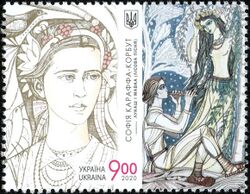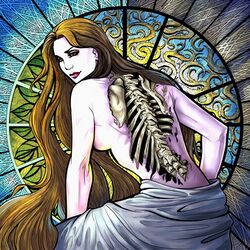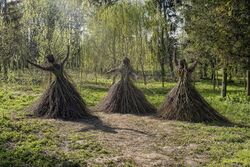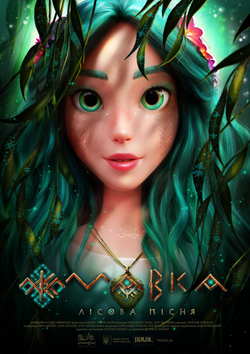Unsolved:Mavka
 Stamp featuring Lukash and Mavka from The Forest Song | |
| Grouping | Female legendary creatures |
|---|---|
| Folklore | Slavic paganism |
| Other name(s) | Ukrainian: Нявка |
| Country | |
| Region | Ukrainian Carpathians |
Mavka (Ukrainian: Мавка) also Nyavka[1] (Ukrainian: Нявка) is a type of female spirit in Ukrainian folklore and mythology. The Mavka is a long-haired figure, sometimes naked, typically depicted as temptress figures who lure men to their deaths.[2][3][lower-alpha 1]
Terminology
There is variation in the names and spelling, including Ukrainian: Мавка, mavka,[4] навка, navka,[5] нявка, nyavka.[6] However, depending on telling, there are differences between the Mavka and Nyavka. These terms all derive from Proto-Slavic *navь 'the dead', and are cognate with Bulgarian: нави, navi (plural).
Folklore
The spirits known by this term represented the souls of girls who had died unnatural, tragic or premature deaths, particularly unchristened babies.[4] Mavkas often appear in the form of beautiful young girls who entice and lure young men into the woods, where they "tickle" them to death.[7] Mavkas have no reflection in water, nor do they cast shadows. In some accounts, they were also said to help farmers by looking after cattle and driving out wild animals.

A subtype of the Mavkas are the Nyavkas, which behave the same except for having "no back", meaning that their spine and some other insides can be seen;[lower-alpha 2] the most defining feature between determining Mavkas and Nyavkas is whether or not the insides are visible from the back.

Mavkas and Nyavkas were believed to live in groups in forests, mountain caves, or sheds, which they decorated with rugs. They made thread of stolen flax and wove thin transparent cloth for making clothes for themselves. They loved flowers, which they wore in their hair. In the spring, they planted flowers in the mountains, to which they enticed young men, whom they tickled to death. On Pentecost (known as Navka's Easter, Ukrainian: На́вський Вели́кдень),[8] they held games, dances, and orgies. A demon accompanied them on a flute or pipes.
To save an unchristened baby's soul, one must throw up a kerchief during Pentecost holidays, say their name and add "I baptise you". The rescued soul would then go to heaven. If the soul lived up to seven years and did not go to heaven, the baby would turn into a mavka and haunt the earth.
Popular culture

- Mavkas are depicted in literature, most notably in Lesia Ukrainka's The Forest Song and nyavkas are depicted in Mykhailo Kotsiubynsky's Shadows of Forgotten Ancestors.[9]
- In modern culture the Ukrainian music band, Mavka, is named after the mythological creature.[10]
- In 2022, Ukrainian singer Eria released the song "Mavka".[11]
- The 2023 film Mavka: The Forest Song, is based on Ukrainian mythology.[12][13]
See also
- Mavka: The Forest Song (2023 animated film)
- The Forest Song (1917/1918 play by Lesya Ukrainka)
- Forest Song (1963 film)
- Mavka (Authentix) (song by Authentix)
- Mare (folklore)
- Naiad
- Nymph
- Revenant
- Succubus
- Nixie (folklore)
- Skogsrå
Notes
- ↑ Kushnir (2014), quote: "Mavka is different from other types of female spirits in that her evil is not intentional. At the sight of a young man, she falls into a trance and realizes her actions too late to change anything. Mavka is a very beautiful young maiden with very long hair ..."
- ↑ Those were more often called "Nyavka" and they were believed to live in Western Ukraine, which has more dangerous mountain rivers than Central Ukraine, while Mavkas, who were believed to live in Central Ukraine, had their backs.
References
Citations
- ↑ "Михайло Коцюбинський — Тіні забутих предків (аналіз, паспорт твору)" (in uk). https://www.ukrlib.com.ua/review/printit.php?tid=18146.
- ↑ Bilodid (1973), p. 587, volume 4.
- ↑ Kushnir (2014).
- ↑ 4.0 4.1 Hrinchenko (1958), volume 2, article 395.
- ↑ Hrinchenko (1958), volume 2, article 471.
- ↑ Hrinchenko (1958), volume 2, article 573.
- ↑ Halaichuk (2016), pp. 181–183.
- ↑ Hrinchenko (1958), volume 2, article 474.
- ↑ Набока, Марічка; Джулай, Дмитро (2019-06-04). "Чарівні істоти з прадавніх українських міфів. У що вірили пращури" (in uk). Радіо Свобода. https://www.radiosvoboda.org/a/29430833.html.
- ↑ "Mavka". January 6, 2024. https://www.discogs.com/artist/6955896-Mavka.
- ↑ (in en) ERIA - MAVKA (Official Music Video) Eurovision 2022 Ukraine 🇺🇦, https://www.youtube.com/watch?v=nfkXSHUBCpA, retrieved 2023-05-11
- ↑ Malamuzh, Oleh; Ruban, Oleksandra; Yermak, Yevheniy (2023-08-15), Mavka: Lisova pisnya, Sarah Natochenny, Mike Pollock, Marc Thompson, Animagrad Animation Studio, FILM.UA Group, Ukrainian State Film Agency, https://www.imdb.com/title/tt6685538/, retrieved 2024-01-07
- ↑ Ide, Wendy (2023-07-30). "Mavka: The Forest Song review – formulaic Ukrainian animation makes a plea for nature" (in en-GB). The Observer. ISSN 0029-7712. https://www.theguardian.com/film/2023/jul/30/mavka-the-forest-song-review-ukrainian-animation.
Works cited
- Buynova, Tatyana Yuryevna (2008) (in ru). Akvilegia. ISBN 9785901942611. http://www.e-reading.mobi/bookreader.php/1020825/Buynova_-_Deti_Svaroga._Mify_vostochnyh_slavyan.html.
- Bilodid, Ivan Kostyovych, ed (1973) (in uk). http://sum.in.ua/s/mavka.
- Halaichuk, V. (2016) (in uk). Клуб Сімейного Дозвілля. https://archive.org/details/miff2016.
- Hrinchenko, B. (1958) (in uk). Академії наук Української РСР. http://hrinchenko.com/slovar/znachenie-slova/29878-navskyj.html.
- Kushnir, Dmitriy (2014). Creatures of Slavic myth. USA. ISBN 978-1-5056-2802-9. OCLC 1003859523.
External links
- "Mavka" — Internet Encyclopedia of Ukraine
- "Kostroma" — Encyclopedia of Mythology (in Russian)
 |
